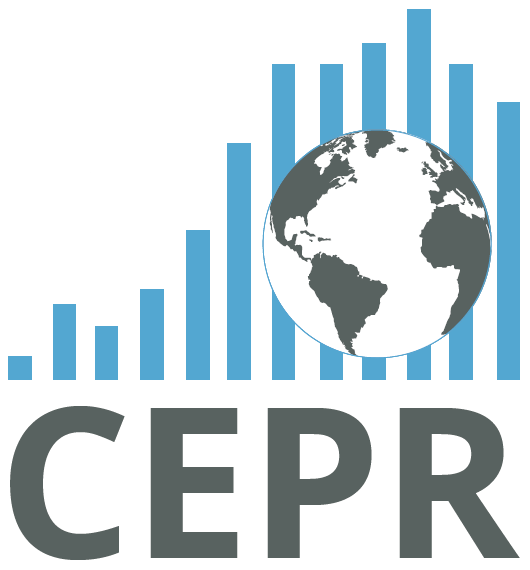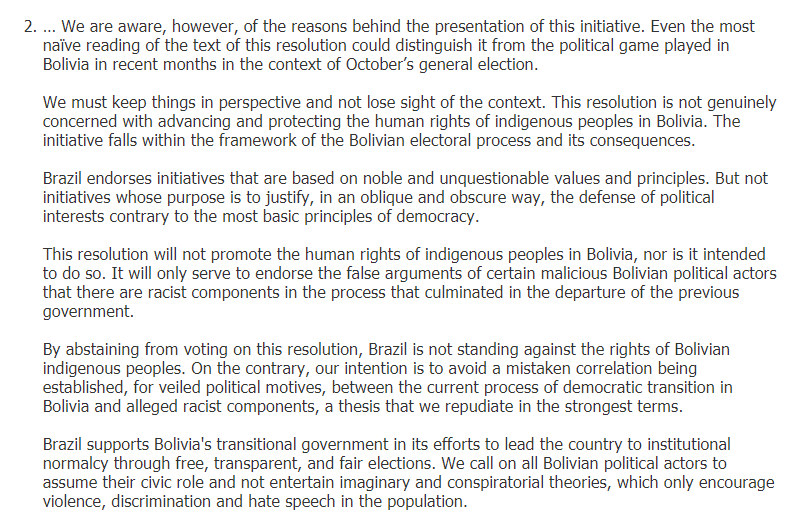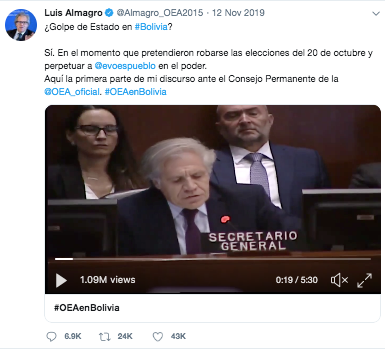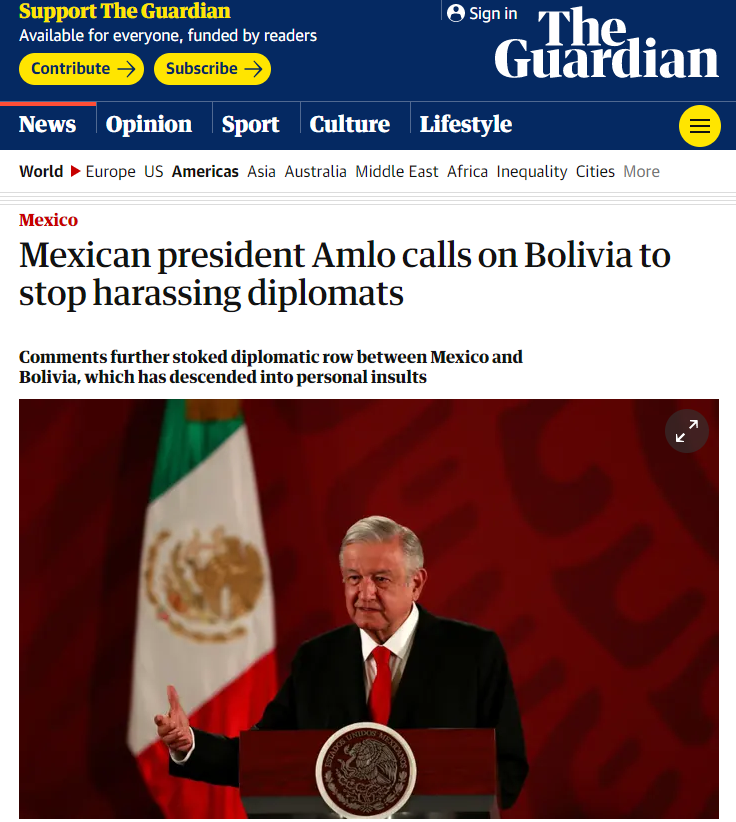CARICOM Stands Up to Bolivian Coup Regime — And to Almagro's Interventionist Agenda
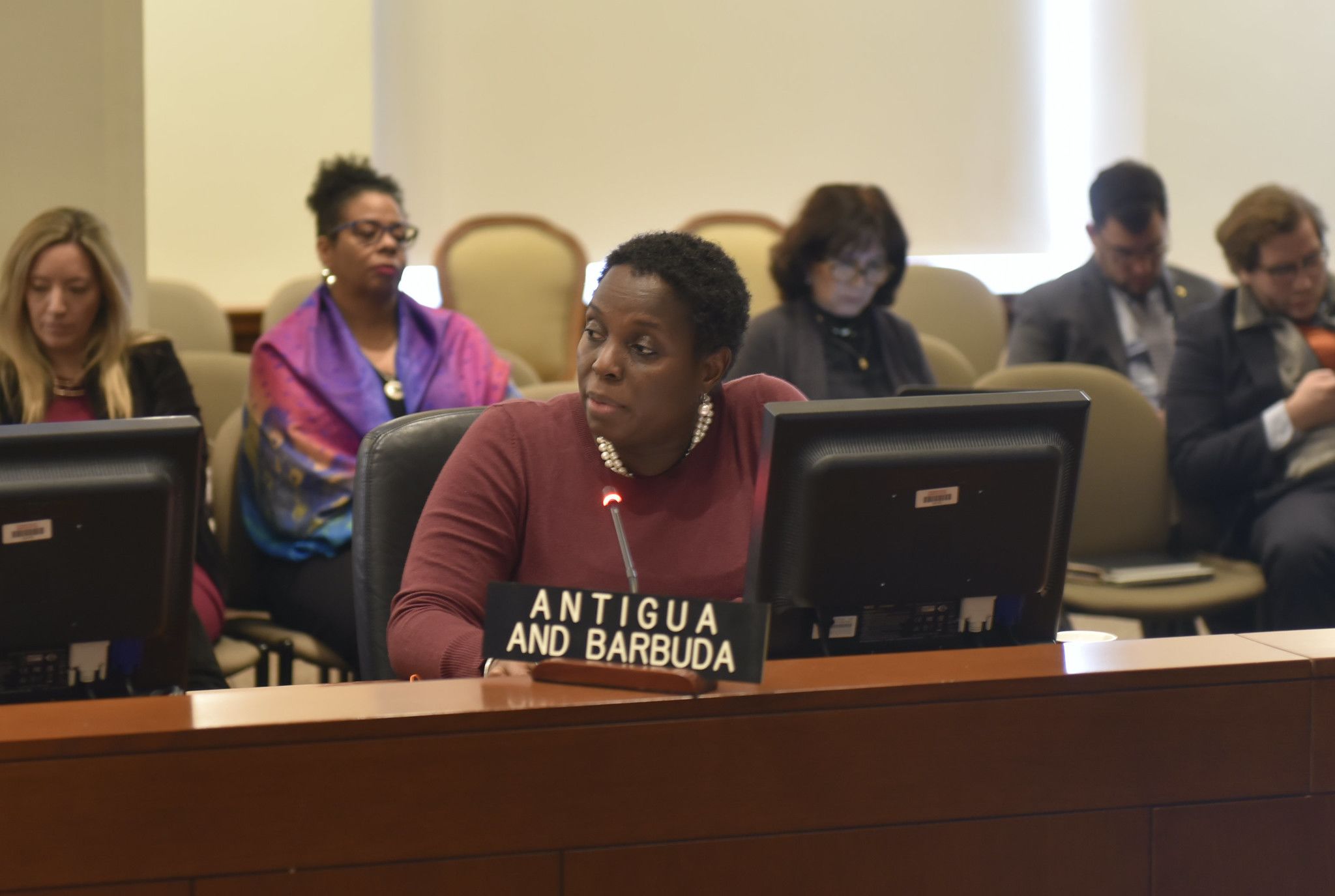
It went largely unnoticed in the media, but toward the last few days of 2019, the Permanent Council of the Organization of American States (OAS) passed a resolution challenging the narrative pushed by the United States and OAS Secretary General Luis Almagro regarding the situation in Bolivia, including the removal of president Evo Morales in a coup on November 10.
Permanent Council Resolution 1142, or the “Resolution Rejecting Violence in Bolivia and Calling for Full Respect of the Rights of Indigenous Peoples in the Plurinational State of Bolivia,” was approved in the December 18 regular meeting of the OAS Permanent Council. It reads as a strong condemnation of the Bolivian coup regime’s human rights violations.
The Resolution and the Bolivian Coup Regime
The resolution was approved with 18 votes in favor, 4 votes against, and 11 abstentions (each of the 34 member states of the OAS Permanent Council has a vote). Haiti was absent. Significantly, the resolution was presented by members of the Caribbean Community (CARICOM) and endorsed by 13 CARICOM countries plus the representatives of Argentina, Mexico, Nicaragua, Panama, and Uruguay.
The vote was not without controversy. The day before the meeting, the Bolivian coup regime’s mission to the OAS had proposed several amendments. Many member states saw these as incompatible with the original CARICOM resolution and argued that Bolivia’s coup government was, in fact, proposing an altogether different resolution. Rather than condemning racist violence, the Bolivian regime’s proposal sought to consolidate “the support of the international community for the process of national reconciliation and new presidential elections that will constitute the fundamental mandate of President Jeanine Añez’s transitional government.”
During the Permanent Council debate, the ambassador to the OAS from Bolivia's coup regime, Jaime Aparicio Otero, visibly uncomfortable with the turn of events, said, “Bolivia is living through a very tough moment. Reading the observations presented here by the CARICOM countries, I get the impression that many are not interested in the truth; that seems to be irrelevant. In Bolivia, and I can now prove this, there was no racist violence, there were a series of attacks made by armed groups linked to Evo Morales.” In an attempt to demonstrate the good rapport between the security forces and the population, Aparicio described how police officers of indigenous descent “hugged” some of the inhabitants of Senkata ― the site of a civilian massacre just days after the coup ― and how the new government had succeeded in its mission of “pacification.”
Jaime Aparicio Otero pushes back on the CARICOM resolution. (via OAS)
Jaime Aparicio Otero pushes back on the CARICOM resolution. (via OAS)
Aparicio pushed back on the findings of the Inter-American Commission on Human Rights, which had referred to the civilian deaths in Senkata as a “massacre.” The de facto representative claimed that his government now had proof that the bullets used in the slaughter “did not belong to the Bolivian military.” Both national and international journalists have thoroughly documented the killings that took place in Senkata, and there is much photographic evidence to refute Aparicio’s claims.
Aparicio also disputed the findings of the Inter-American Commission on Human Rights. (via OAS)
Aparicio also disputed the findings of the Inter-American Commission on Human Rights. (via OAS)
The Coup Regime's Allies
Unsurprisingly, the Bolivian coup regime’s rejection of the resolution was endorsed by the countries most supportive of the November military coup in Bolivia: the United States, Colombia, and the Venezuelan representative (since April 2019, the opposition led by Juan Guaidó has been endowed with a vote in the OAS Permanent Council). Brazil, another strong backer of the Bolivia coup, abstained, arguing, “If taken separately from the context of the democratic political transition underway in Bolivia, the elements contained in the resolution would count on the support of Brazil.”
Ratifying its support for Morales’s overthrow, but cautious not to endorse racist human rights abuses, Brazil’s diplomats claimed that the CARICOM resolution could not be understood as a genuine concern for human rights, but rather as an attempt to strengthen the ex-president. The Brazilian government demanded that their position be made clear in a footnote in the resolution itself, in which they state: “We are aware, however, of the reasons behind the presentation of this initiative. Even the most naïve reading of the text of this resolution could distinguish from the political game played in Bolivia in recent months in the context of October’s general election.”
Brazil's footnote on the resolution. (via OAS)
Brazil's footnote on the resolution. (via OAS)
The United States has ignored the abuses of the coup government, instead using the Permanent Council as a forum to denounce alleged electoral fraud in the October 20 presidential elections won by Morales. In his speech, US Ambassador to the OAS Carlos Trujillo evaded the issue of human rights abuses against indigenous people, and reiterated the United States’ rejection of the “massive and intentional electoral fraud” carried out by Morales. Trujillo complained that the resolution “says nothing about Morales’ electoral fraud and subversion of democracy …. Now that the OAS and DECO [the OAS’s Department of Electoral Cooperation and Observation] have proven fraud, you would think that countries would take it seriously.” (The OAS and DECO have not, in fact, proven fraud — quite the contrary — and The Los Angeles Times has reported that Trujillo “had steered the [OAS’s] election-monitoring team to report widespread fraud….”). The United States insisted on the addition of a footnote denouncing the contents of the resolution as following:
The United States ambassador to the OAS. (via OAS)
The United States ambassador to the OAS. (via OAS)
… the narrative of former president Morales, who used claims of racism to hide his massive and intentional election fraud. Instead of adopting this resolution, OAS Member States should support the transitional government of Bolivia’s commitment to work with all political parties and social actor stakeholders, including indigenous groups, to organize fully inclusive, free and fair elections.
In the footnote, the US praised Bolivia’s coup regime for its “continuing use of indigenous symbols, its adherence to all Constitutional norms and its ongoing engagement with the Inter-American Commission of Human Rights.”
CARICOM's Influence at the OAS
CARICOM’s 14 votes in the OAS are four votes short of an outright majority in the Permanent Council. This has proven to be a source of significant political leverage for Caribbean states. Haiti was conspicuously absent in this Permanent Council meeting. Haiti’s allegiance to Secretary General Almagro can perhaps be better understood as the fruit of a mutual agreement.
In January 2019, Haiti broke from CARICOM and voted against recognizing Nicolás Maduro as president of Venezuela. Throughout 2019, Almagro, whose endorsement of efforts to delegitimize and oust Maduro have been a focus of his tenure in the OAS, turned a blind eye to the Haitian government’s violent repression of protests that threatened to bring down the administration of President Jovenel Moïse.
The passing of the December 18 resolution is important for several reasons. On November 12, the secretary general claimed, “Yes, there was a coup in Bolivia on October 20, when Evo Morales committed electoral fraud,” an assertion that went largely unchallenged in the Permanent Council.
Luis Almagro's controversial tweet. (via Twitter)
Luis Almagro's controversial tweet. (via Twitter)
Few countries condemned the coup d’état, and Mexico stood virtually alone in openly questioning the validity of the OAS’s accusations of electoral fraud in the Permanent Council.
"Mexican president Amlo calls on Bolivia to stop harassing diplomats." (via The Guardian)
"Mexican president Amlo calls on Bolivia to stop harassing diplomats." (via The Guardian)
CARICOM Unity Could Be Bad News for Almagro
Diplomatic sources at the OAS have expressed, off the record, that the vote on Bolivia may signal not only the return of a more united CARICOM but also waning political support for Secretary General Almagro.
Due to his alignment with the United States in its regime change effort against Venezuela’s government, among other regional objectives of the Trump administration, Almagro has been the target of much criticism, including from CARICOM states between 2017 and early 2019. However, he appeared to emerge victorious when the majority of the OAS Permanent Council voted in April 2019 to include the representative of the president of the Venezuelan National Assembly, Juan Guaidó, as a member of the Permanent Council. This move divided CARICOM, which had previously blocked several resolutions aimed at isolating the Maduro government, on the issue of Venezuela.
CARICOM unity could also play a decisive role in the forthcoming election of the new OAS secretary general in March 2020, even if Venezuela continues to be a strongly divisive issue amongst Caribbean states, as demonstrated in the vote on the Permanent Council Resolution CP1143 "Regarding Recent Events in Venezuela," in which the Permanent Council resolved to "welcome the reelection of Juan Guaidó as the President of the Venezuelan National Assembly."
It remains to be seen whether Almagro’s reelection bid, firmly endorsed by the United States, can succeed, or whether growing dissent among member states will charter an alternative path for the OAS this year, with new leadership.
